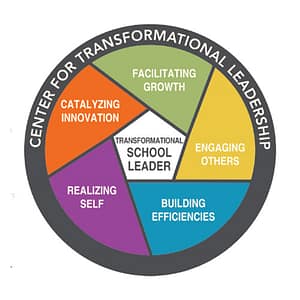
- Lorraine McDonald
- June 2, 2022
Facebook
Twitter
WhatsApp
Telegram
Email
Transformational Leadership
Education is an important aspect of human life. How we receive and translate it in our daily way of life is largely dependent on the way it gets passed on. What works best for one institution and how it needs to be, is based on careful strategic planning and consideration of its vision.

Leadership is defined as “a process of social influence whereby one person can enlist the aid and support of others in the accomplishment of a common task”. Educational leadership is the process of enlisting and guiding the talents and energies of teachers, pupils, and parents toward achieving common educational aims.
The headteacher/principal is commonly thought to be the school leader, however, school leadership may include other persons, such as the collective membership of the senior leadership team, the governing body, and others who contribute towards the aims of the school. Schools need leaders who have a vision for improving quality and learning outcomes, and who are also effective at ongoing management tasks.
 Contrary to popular belief, good leaders are made, not born. Effective leaders desire and demonstrate willpower through a never-ending process of self-study, education, training and experience. To inspire your staff into higher levels of teamwork, you must be, know and do. These skills do not come naturally but are acquired through continual work and study. Good leaders continually improve their leadership skills; they are not resting on their achievements.
Contrary to popular belief, good leaders are made, not born. Effective leaders desire and demonstrate willpower through a never-ending process of self-study, education, training and experience. To inspire your staff into higher levels of teamwork, you must be, know and do. These skills do not come naturally but are acquired through continual work and study. Good leaders continually improve their leadership skills; they are not resting on their achievements.
Education is an important aspect of human life. How we receive and translate it in our daily way of life is largely dependent on the way it gets passed on. What works best for one institution and how it needs to be, is based on careful strategic planning and consideration of its vision.
Effective leadership is always understanding and probing the audience to inform oneself. Leadership is tapping into human resources to provide the highest level of service. A good leader may not possess all the requisite skills but will be able to identify those who have the skills and utilise them effectively. Leadership is not believing your own press; and leadership is never forgetting the why and the ethics of the mission and all those individuals – teachers and students – who have placed their trust in you. Leadership in education means always keeping the learning of the students as the primary goal. This requires doing everything necessary to support students and teachers. It means ensuring that teachers have everything they need to do their jobs well.
It means keeping up on the latest knowledge in teaching, content, and organisational theory. It means motivating and educating. It means keeping unproductive, even hostile, external forces at bay, and it means supporting societal change that will increase all students’ learning. It means advocating externally and internally for student learning.
Schools need leaders with a vision for improving the school’s learning environment within a well-functioning school-based management (SBM) system. SBM involves setting school directions concerning students, teacher development, and allocation of material and financial resources. Effective SBM impacts motivation, commitment, and student and teacher success by: 
- facilitating school leadership that is both appropriate to the unique context and needs of the school community.
- developing and implementing school improvement plans.
- establishing fair and effective teacher appraisal systems.
- structuring classrooms and schools according to school needs.
- building partnerships with the community
- ensuring that frameworks exist to support the functions of school departments and staff.
Effective school leadership is transformational in its approach. Transformational leadership fosters a sense of purpose and meaning to unite people for a better cause.
In August 1933, a teacher met a pupil at a school for the first time. The pupil went on to become a household name, sometimes controversial and always outspoken and central to British society for 80 years. The teacher on the other hand, is far less well known and yet, his impact on the education of children across the world has been both profound and significant, arguably paving the way for the modern-day holistic pupil-focused education systems of countries from America to Australia. The pupil was Prince Phillip, Duke of Edinburgh, the late consort to Queen Elizabeth II and his headteacher was Kurt Hahn.
Hahn created a school in Gordonstoun in the northeast of Scotland, designed to help pupils discover interests and passions, to prepare them to thrive and lead not just to pass tests. It would develop strength of character and future leaders and it would focus on holistic achievement not just academic excellence. It was a school focused on experiential education whereby opportunity to learn through experience sat alongside traditional classes.
Our church schools need leaders who are transformational in their leadership, leading both pupils (and staff) to become great leaders and model themselves after the greatest transformational, servant leader, Jesus Christ. Our school leadership should ‘educate pupils for eternity’.
‘Every human being, created in the image of God, is endowed with a power akin to that of the Creator – individuality, power to think and to do. The men and woman in whom this power is developed are those who bear responsibilities, who are leaders in enterprise, and who influence character. It is the work of true education to develop this power, to train young people to be thinkers, and not mere reflectors of other people’s thought. (Ellen G. White, Education, pg. 12)
Lorraine McDonald is the Education Director for the British Union Conference

How Should Christians be Different?
September 6, 2023

The Pastoral Caregiver – Bearer of Stories
September 6, 2023

What Takes to be Different?
September 6, 2023

The Beauty of Diversity Within the Body of Christ
September 6, 2023

The Butterfly, an Object Lesson of Transformation
September 6, 2023

Mitigating the Risks of Cultural Compromises
September 6, 2023

Embracing Christ-Centered Counterculture
September 6, 2023








